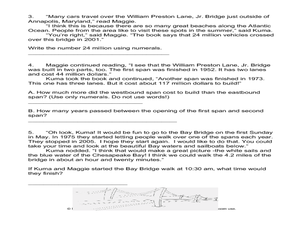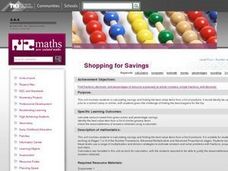Curated OER
Teaching Students Mathematical Reasoning Skills
Students can build upon their basic math skills and become higher order thinkers when we encourage the following principles.
NTTI
Putting Together Ten
Groups explore sets of 10 items in two varieties (i.e. 3 white buttons and 7 black ones, or 5 bears and 5 bunnies). They brainstorm about their objects, write math sentences to represent what they have, and report their discoveries to...
Curated OER
Regents Review Worksheet #1: Principles of the U.S. Constitution
Kids who take the Regents Exam really need to know a lot of information. This is a wonderful exam review tool that includes 26 pages of questions, charts, and suggested readings to help upper graders pass the test. It focuses on all...
Discovery Education
Architects in Action
Hands-on and real-world applications are great ways to teach mathematical concepts. Creative thinkers examine how ratios are used to create scale models of buildings and structures. They practice working with ratios by looking at a map...
PricewaterhouseCoopers
Credit and Debt: Decisions, Decisions...
Borrowing money seems like a great idea until you are in over your head. High schoolers learn the benefits and risks associated with credit and how to be a responsible borrower. More than just credit cards, they learn trustworthiness is...
Curated OER
How to Incorporate April Fool's Day into Your Teaching
Celebrate the merriment of April Fool's Day without the mischievousness.
Curated OER
$$Adding Up All Your Loot!$$
In this adding money amounts worksheet, learners add four-digit dollars and cents problems with regrouping. Students solve 15 problems.
Curated OER
Expand Your Math By Traveling Over the Chesapeake Bay!
In this Chesapeake Bay activity, students read word problems and answer questions about years passed, and money spent on the two ways to drive over Chesapeake Bay. Students complete 5 problems.
Scholastic
Problem-Soving Strategies, Practice 1: Sample
A variety of word problems help your learners examine the ways that they find solutions. Each question provides opportunities to add, subtract, and multiply time, measurements, and money.
Scholastic
Debate Prompt
Should the government rate music? Are teen juries a good idea? Is space exploration worth the money? Your learners will think critically to tackle these interesting questions, and practice their ability to form persuasive arguments by...
Curated OER
Coin Count & Classification
Students make a prediction about how 100 pennies sort by decade or year and then test their predictions. They organize their data using a graph that is imbedded in this lesson.
Curated OER
What Did It Cost 100 Years Ago?
Students compare prices of good across the century in order to introduce the topic of inflation. They undertand the concepts of inflation and Consumer Price Index (CPI), use online calculators to figure the approximate cost of goods...
Curated OER
Shopping for Savings
Fourth graders calculate savings and identify the best value items from a list of products. They rotate through five studying stations, completing various math activities involving calculators and solving problems related to shopping...
Curated OER
Psyching up the Stock Market: Using the Harkness Method to Explain Behavioral Economics
Students can discuss the stock market and economics by using the Harkness method.
Curated OER
Tell Me; I’ll Listen
Encourage respect, responsibility, and caring within your classroom with a collection of lessons that spark dialogue and self reflection. To address character traits, lessons touch on topics such as staying safe in the cafeteria,...
Curated OER
Fishing Responsibility
In this fishing worksheet, learners read about fishing responsibility and then answer math word problems about money, time, and fish. Students complete 3 word problems.
Curated OER
Three Coins on a Table
Learners discuss the subject of coins and heads and tails. They work in groups to solve Fran's problem concentrating on the fact that the coins are in a row. Any group that finishes early can try the Extension problem.
Curated OER
Making Choices to Save Money on Food
Students review lists of coupons and complete a worksheet to analyze the benefits of the specials. For this household budget lesson, students determine which foods are nutritional and the advantages of using coupons or specials to save...
Curated OER
Shopping
Fifth graders simulate a shopping experience. Students are given a specified amount of money and they must spend it. Students choose five items they wish to purchase and determine if they can afford the items.
Scholastic
Study Jams! Fractions
What can quesadillas teach your class about fractions? More than you might think. AJ and Zoe from the StudyJams! crew use this Mexican cuisine to explain how fractions are just equal parts of a whole, defining the key terms numerator and...
Scholastic
Mega-Fun Fractions
Creative and fun lessons help kids get some hands-on experience with fractions. The resource includes 50 innovative ways to teach kids about equivalent fractions, adding and subtracting fractions, using fractions in money math and...
Perkins School for the Blind
Coin Identification
You got some money, and you're not afraid to use it. Before you can use that money, you need to know what it's worth. Included is a set of activity instructions that will help your visually impaired learners indentify coins. Pupils are...
Curated OER
Econ in a Bag
Here is a nice idea, have your young entrepeneurs form their own companies. Each company is given a paper bad to locate and place resources in that they can use to create products their businesses sell on Sale Day. They identify and...
Curated OER
Funding a Way to the Top
Review economic vocabulary, presidential election campaigns, and current campaign budgets (2004). Your class will determine how they feel about the amount of money spent on presidential campaigns, they will read an informational article,...

























